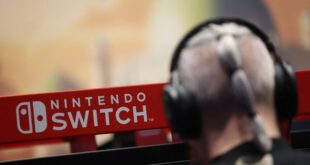WASHINGTON: US government lawyers rested their case on Tuesday in the landmark antitrust trial against Google after five weeks of testimony that saw some of big tech’s most senior executives take the stand.
At the heart of the case is Google’s search engine and whether the company has acted illegally to preserve its overwhelming dominance.
Here are five things we have learned so far at the trial:
Apple makes billions on Google
Apple’s intricate relationship with Google was the trial’s main source of intrigue, as the US government contends that it is by paying billions of dollars to the iPhone maker every year that Google is able to maintain its monopoly.
Exactly how much has yet to be made public, but according to some estimates mentioned in evidence, every year Google pays a total of ten billion dollars to Apple as well as Samsung and others to make sure it keeps a default position on web browsers or phones.
But the payout to Apple is established through a revenue share deal and analysts from investment firm Bernstein think that the sum may be as high as US$20bil (RM95.2bil) a year, accounting for 15% of Apple’s operating profits.
Anything for Bing
Another major player in the Washington DC trial was Microsoft that since 2009 has been trying to lift its Bing search engine to be more than a distant also-ran to Google.
Microsoft CEO Satya Nadella told the courtroom that it would be a “game-changer” for Bing to win default status on the iPhone and court evidence revealed all the ways that the maker of Windows and Xbox was prepared to get there.
In 2018, discussions with Apple went as far as a proposal to rebrand Bing under a different name.
And, according to Bloomberg, Microsoft even floated an outright sale of Bing to Apple in order to bring some much needed competition to Google.
Nadella said he never gave up finding a way to persuade the iPhone maker, but became convinced over time that any flirtations with Bing were being used by Apple to negotiate with Google.
‘Bad optics’ for Apple
The trial has seen hundreds of documents and emails introduced as evidence and one featured the current CEO of Google Sundar Pichai making a potentially embarrassing observation about the default deals, when he was still a product manager.
In a 2007 email, Pichai raised concerns that a default deal with Apple was maybe bad “optics” if it ruthlessly blanked other browsers.
“I don’t think it is a good user experience nor the optics is great for us to be the only provider in the browser.”
‘Benevolent dictatorship’
Another executive who took the stand was Arjan Dijk, Chief Marketing Officer of Booking.com. He described a market for online advertising where a company had no choice than buying ads with Google.
Dijk is a former Google employee, and his exchanges with Google’s lawyer sometimes got heated, with Judge Amit Mehta having to intervene to get the discussion back on track.
Dijk complained that Booking.com had to spend hand over fist for its ads to be well placed in search results.
He compared the company to a “benevolent dictatorship,” he said.
Apple considered DuckDuckGo
The trial has seen CEO and executives take turns on the stand, including the boss of DuckDuckGo, a search engine that puts its main emphasis on user privacy but has failed to gain major success against Google.
Chief executive Gabriel Weinberg told the court that in 2018 he was in serious discussions with Apple to make DuckDuckGo the default search engine for private browsing on iPhones.
“We thought they were actually really interested,” Weinberg said.
But despite early enthusiasm, talks with Apple went nowhere and Weinberg blamed Apple’s contract with Google, which, he surmised, also barred him from tie-ups with Samsung and others. – AFP
 BeritaKini.biz Berita Viral Terkini di Malaysia
BeritaKini.biz Berita Viral Terkini di Malaysia





